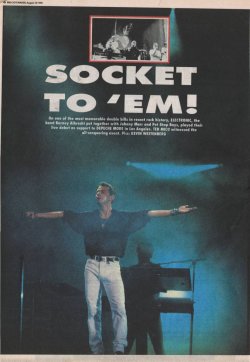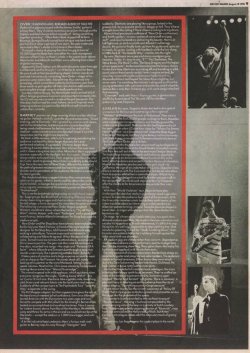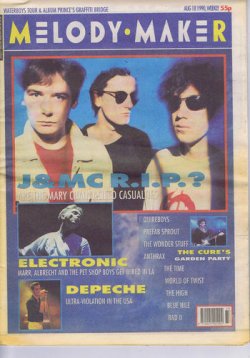You are using an out of date browser. It may not display this or other websites correctly.
You should upgrade or use an alternative browser.
You should upgrade or use an alternative browser.
Depeche Mode Socket To 'Em! (Melody Maker, 1990)
- Thread starter demoderus
- Start date
- Joined
- Aug 15, 2019
- Messages
- 7,493
- Reaction score
- 143
- Points
- 63
" On stage, he's three-parts Freddie Mercury, two-parts Marc Almond and one-part Elvis. He revels in the mass adoration and exudes his happiness with such vehemence, it's difficult to stop liking him. It's well nigh impossible to stop watching him. "
A review of Depeche Mode's Dodgers Stadium performance alongside Electronic that manages to sustain an immense vibe even while picking up analytically on lots of fine detail. The writer devotes as much if not more time to Electronic, but the article thrums with a sense of occasion and the main photo is one of the best I've seen.
Over 18 months ago, Bernard Albrecht told the Maker of his plans to record with the former Smiths' guitarist Johnny Marr. They'd met on numerous occasions throughout the Eighties and had always talked casually of "doing something together some day". When Peter Hook skipped off to form Revenge, Bernard finally turned faint intrigue into hard work and hard fact. Over a period of two years, the pair wrote and recorded in Marr's studio in his house in Manchester.
The band's choice of playing their first live gig in front of 70,000 Depeche Mode fans was either the most courageous decision of their lives, or there's a hole in the ozone layer above Manchester and Albrecht and Marr were suffering from a bout of global warming.
Apparently Dave Gahan met Albrecht at a party some time ago and Bernard said he thought it would be fun to open for them. He was drunk at the time and being stupid. Gahan was drunk and took him seriously, reminding New Order's singer of his promise some weeks later. Albrecht was thus coerced into accepting, which meant that suddenly the Electronic pair had three weeks to put together all their ramshackle odds and ends and complete enough songs to actually perform live.
Two days before the gig, the Manchester mafia arrived in full effect, bringing various musicians and assorted miscreants into the US with any excuse and a couple of forged passports. The Mondays had arrived the week before, several Inspirals were loitering and even ex-patriots like Mick Hucknall turned up to satisfy their curiosity.
Barney saunters on stage wearing shorts and tee-shirt but no guitar. He looks wistfully up at the sky and announces, "Good evening, we're Electronic". He's greeted by screams and cheers, not for his introduction, but because of a massive food fight being conducted between the balcony and the stalls of the stadium - some ancient and arcane baseball ritual. It isn't the auspicious start he might have hoped for.
He looks a little nervous, which isn't surprising considering the audience is at least five times larger than any he's ever performed to before. It's probably 100 times larger than anything A Certain Ratio drummer Don Johnson has ever seen and it's been a long time since either Albrecht or Marr supported anyone, especially in the daylight. But, then again, Albrecht has always taken awkward risks, from stepping up to the mike after Ian Curtis' death to pinning New Order's credibility to the World Cup. Since the very start of New Order, Albrecht has travelled the path of greatest resistance and has learnt to ignore the dictates and expectations of his audience. Electronic is merely the latest gamble.
The shaded and close-cropped Johnny Marr concentrates solely on his guitar, which is barely audible above the swirling digital babble, as bongos bong and electric drums pad out a song vaguely reminiscent of the brooding pulse on New Order's "Brotherhood".
This is not the breathtaking beginning we might have hoped for. Supergroups like Blind Faith or Travelling Wilburys have always been long on egos and short on ideas - reminding one of the old adage: a horse designed by committee becomes a camel. The following instrumental New Order-tinged spaghetti Western soundtrack shows where the hump is. "Try All You Want" slashes deeper, with more "Technique" and a good deal more fluency, before Albrecht introduced Pet Shop Boys and the stadium erupts.
New Order and Pet Shop Boys have always been mutual fans. Earlier last year Mark Farrow, a friend of Bernard and sleeve designer for Pet Shop Boys, told Tennant that Albrecht was making a solo album. Tennant expressed an interest in collaborating and Albrecht agreed. When the day of reckoning came, Tennant was too nervous to attend alone, so convinced Chris Lowe to join him. The pair met Marr and Albrecht and in two days, recorded two songs - the single and "Patience Of A Saint", where Albrecht and Tennant duet through a song that sounds suspiciously like a gleaming outtake from "Actually".
It takes years of practice and a large expense account to wear suits as sharp as Neil Tennant. He stands dead still, rarely looking at his partner or the rest of the band, letting his tailor speak volumes. Next to him, Chris Lowe stands by his keyboard looking like an extra from "Worzel Gummidge".
The crowd respond with mild applause, which quickens when everyone recognises the single, "Getting Away With It". This isn't just a 12-inch mix: Electronic take a golden mile, breathing cold shivers and volcanic blasts into the lacklustre vinyl version. Suddenly all the comparisons to The Psychedelic Furs' "Love My Way" evaporate in the swing.
The Pet Shoppers depart, but their appearance gives the rest of the band a much needed jolt of confidence. Ever since Albrecht toured America with the Bunnymen two years ago and was forced to compete with McCulloch for the limelight, Bernard has looked an accomplished and carefree frontman. Now it seems he's taken dance lessons from Bez of the Mondays. He starts to sway and throw his arms in the air and we could almost be at the Hacienda - except the stadium is 1,000 times bigger and sells hot dogs.
A brittle industrial beat underpins Marr's furious wah-wah guitar as Barney raps his way through "Gangster" and suddenly, Electronic are playing like a group, locked in the groove and, to use present parlance, baggy as hell. They'd have brought down the ceiling if there'd been a ceiling to bring down.
Albrecht had promised a collision of "New Order synthesisers and Smiths guitars - a cross-section of weird stuff and pop stuff", and now his band are delivering the bounty. Marr is in full flight and, as darkness falls and Albrecht's white legs dazzle, the guitarist finally looks up from his guitar and spins on his heels, his guitar sizzling with feedback while the low-slung hi-NRG funk of "The Donald Way" crackles into the night.
By now, Electronic are a pop and dance amalgam gone haywire. Today, it's easy to say, "F*** The Charlatans, The Stone Roses, The Mock Turtles, The Soup Dragons and the legion of heirs apparent". As Bernard launches into the furious chorus for the third time, Electronic are taking off and travelling to wild, exotic places these bands couldn't even imagine existed. By now they're everything the audience at Spike Island and Alexandra Palace had hoped The Stone Roses might be, but never were. I'm watching Manchester's old guard snuff out the young pretenders with such ease and authority, and it's hard to believe this is only their first ever gig, with some songs rehashed that morning.
"Cinematic" ends with Marr's flaying guitar, a glorious bass shuffle by Robertson of The The and still the relentless pulverising beat. Exquisite.
Earlier this year, Depeche Mode decided to do a spot of promotion for the tour and went to sign a few copies of "Violator" at Warehouse [sic] Records in Hollywood. They were a little surprised to find 20,000 people waiting for them. Modettes were spread over six square blocks and literally ground the entire city to a standstill. Nothing like this had happened in L.A. for years - even when U2 shot their video for "Where The Streets Have No Name" on a Downtown roof. Depeche Mode bigger than Jesus? Not quite, but they'd give Bono a run for his money and are taken as seriously and followed as fanatically here as The Cure or New Order are in Britain.
Last edited:
- Joined
- Aug 15, 2019
- Messages
- 7,493
- Reaction score
- 143
- Points
- 63
For three months the radio has played nothing but Depeche in the run-up to their show at the Amphitheatre (a smallish venue) and their two sell-out shows at the enormous Dodger Stadium. The band have managed to reach such ludicrous popularity partly because an American audience found validity in the band's electro-dance and empathy in their themes of alienation. Most of the Modettes are dressed in Euro-goth black - in California, the sign of an undertaker or a junkie. Depeche's fans share a romance with The Cure and other Brit bands who allow them to express a rebellion in controlled doses. Why drive a Harley, act the rebel and run a red light when you can walk in the company of like minds and stop an entire city? Depeche offer the chance for Americans to step outside their own cliché.
With their "World Violation" tour, Depeche have also challenged the idea that stadium gigs always need huge video screens to make the audience feel a part of the occasion. With the three other members static behind their synth banks, a live video would be about as interesting as a documentary on Albanian potato farming. Instead, Depeche have developed a novel idea - a singer who's larger than life. Dave Gahan has become a star.
On stage, he's three-parts Freddie Mercury, two-parts Marc Almond and one-part Elvis. He revels in the mass adoration and exudes his happiness with such vehemence, it's difficult to stop liking him. It's well nigh impossible to stop watching him. One minute he's preening himself for "Walls Tumbling Down" [1], then, his arms are outstretched or he's rubbing himself against the mike stand with coy abandon.
All stadium gigs are events rather than concerts, dependent as much on the audience as the performers, and the Dodger fans don't let the the stunning show flag. They spew cheers like leaky fire hydrants and applaud until it hurts their arms.
The only moment of silence comes when Martin Gore straps on an acoustic guitar and plays his two solo numbers. The audience stands in hushed reverence. Either that or they were struck dumb by Gore's charming leather lederhosen. Dickhead. He looks better in those natty leather mini skirts.
The further Depeche fish into their back catalogue, the more irritating their blippy synth-buzz becomes. They've scuffed up most of the material to prevent sterility, but even a super-camped "Master And Servant" still grates. There is, however, a pleasant irony in hearing an entire audience from the city of excess singing "Everything counts in large amounts".
It's the newer tracks like the sinister wooziness of "Policy Of Truth" that truly engross as Gahan prowls and pirouettes across the stage like the phantom of the opera.
This spectacle is only dwarfed by the nachtzeit twang of "Personal Jesus", the song's humour compounded by the accompanying vids of the boys in a variety of butch cowboy hats. Their encore, a body-popping version of "Route 66", may have just overcooked the Hollywood schlock, but Anton Corbijn's travelogue videos add the necessary touch of grainy class.
For one day, Los Angeles was the coolest place in the world.
With their "World Violation" tour, Depeche have also challenged the idea that stadium gigs always need huge video screens to make the audience feel a part of the occasion. With the three other members static behind their synth banks, a live video would be about as interesting as a documentary on Albanian potato farming. Instead, Depeche have developed a novel idea - a singer who's larger than life. Dave Gahan has become a star.
On stage, he's three-parts Freddie Mercury, two-parts Marc Almond and one-part Elvis. He revels in the mass adoration and exudes his happiness with such vehemence, it's difficult to stop liking him. It's well nigh impossible to stop watching him. One minute he's preening himself for "Walls Tumbling Down" [1], then, his arms are outstretched or he's rubbing himself against the mike stand with coy abandon.
All stadium gigs are events rather than concerts, dependent as much on the audience as the performers, and the Dodger fans don't let the the stunning show flag. They spew cheers like leaky fire hydrants and applaud until it hurts their arms.
The only moment of silence comes when Martin Gore straps on an acoustic guitar and plays his two solo numbers. The audience stands in hushed reverence. Either that or they were struck dumb by Gore's charming leather lederhosen. Dickhead. He looks better in those natty leather mini skirts.
The further Depeche fish into their back catalogue, the more irritating their blippy synth-buzz becomes. They've scuffed up most of the material to prevent sterility, but even a super-camped "Master And Servant" still grates. There is, however, a pleasant irony in hearing an entire audience from the city of excess singing "Everything counts in large amounts".
It's the newer tracks like the sinister wooziness of "Policy Of Truth" that truly engross as Gahan prowls and pirouettes across the stage like the phantom of the opera.
This spectacle is only dwarfed by the nachtzeit twang of "Personal Jesus", the song's humour compounded by the accompanying vids of the boys in a variety of butch cowboy hats. Their encore, a body-popping version of "Route 66", may have just overcooked the Hollywood schlock, but Anton Corbijn's travelogue videos add the necessary touch of grainy class.
For one day, Los Angeles was the coolest place in the world.
[1] - "Halo" is the correct title of this song.



